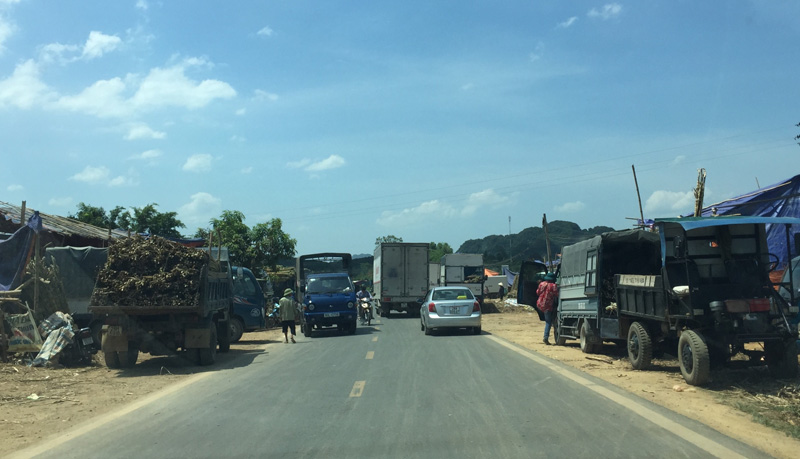


Bam
market was formed five years ago with some local households selling farm
produce at a vacant land lot besides National Highway 6. Thanks to the
convenient transport, the goods were quickly consumed at good prices, thus more
people brought their farm produce to the site. At present, the market attracts
a large number of local farmers, with the number of stalls surpassing 200 at
peak time. The market has been a place of choice of traders from

Traffic congestion often occurs at Bam market in
Apart
from economic benefits, the market right on the highway blocks traffic, posing congestions
and accidents, said Bui Van Tuoi, Chairman of the People’s Committee of Tay
Phong commune. He added that it is difficult to ensure transport safety and public
order at the area due to the heavy traffic load on the road.
The stalls
and even tents, which use second hand materials, have encroached the road and
ruined the view, Tuoi noted, saying that environmental sanitation is another
problem.
To
tackle the problems while keeping the driving force for the local economy, the
People’s Committee of Cao Phong district approved a plan on building the Cao
Phong produce market on
According
to Ha, in April this year, the contractor, the Hai Duong Veterans joint Stock Company,
coordinated with local authorised agencies to pay compensation worth more than
7 billion VND to relocate 60 households in the area.
With a
total investment of 60 billion VND, the Cao Phong market will house 230 stalls and
30 to 50 lorries weighing 20 tonnes each, said Pham Manh Hung, Director of the Hai
Duong Veterans joint Stock Company.
Hung
noted the market, once operational, will be a trading centre for agricultural
products from the locality and surrounding areas, adding that it also helps
reduce risks of traffic congestion and ensure traffic safety on the highway.
The
company is speeding up the work progress so that the market can be put into
operation in the third quarter of 2018 as scheduled.
Meanwhile,
local authorities have taken measures to reduce traffic congestion on Highway 6
during the time the market is under construction.